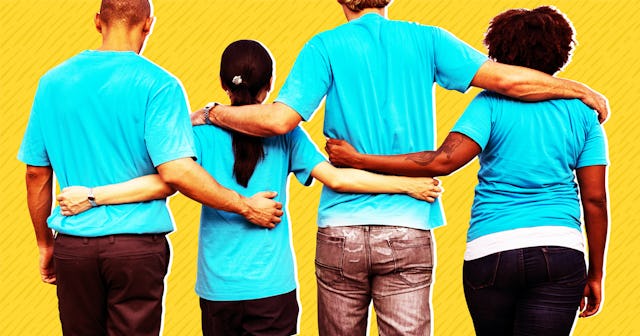Forget Self-Care, We Need More Community Care

At this stage of my life, I’m growing to hate the term “self-care.” Especially when it’s used to imply one must go the extra mile to obtain a greater or somewhat superior level of mental, physical and/or mental health. Getting a manicure, soaking in the tub, or paying for an hour-long massage are all luxurious forms of self-care. And not everyone has the time, money or resources to achieve this type of “self-care success.” It’s not realistic.
For me and so many other moms, we are too busy indulging our little people to indulge ourselves. Could we make time? Sure. And sometimes, we do. But there are only so many hours in a day, and no one can have it all. Therefore, something on our never-ending to-do list will always wind up sacrificed.
Because in a world so quick to offer advice and offers to help, it seems we lack those individuals who physically step in, roll up their sleeves and tackle some of the dirty work for others. We live in a “fend for yourselves” type of society. One where we see another person struggling and snidely remark, “You better do something about that,” instead of shutting the hell up and helping to carry the load a bit.
This is exactly why some experts, like Nakita Valerio, a Toronto-based community organizer and researcher specializing in building multicultural bridges, are urging others to extend their empathy and neighborly spirit onto others with a different form of compassion — community care.
During a phone interview with Mashable, Valerio says community care focuses on “people committed to leveraging their privilege to be there for one another in various ways.”
Community care still circulates throughout the developing world and various social movements today, but it’s almost unheard of in mainstream culture. And although it can and does include helping others in forms of good deeds without being asked, community care also means standing with others during protests they find near and dear to their heart, hosting a potluck to strengthen your town, and simply investing in relationships.
Much like we would do anything for family, community care focuses on that same principle — only extending it beyond the family’s bloodline. When we see someone in a time of distress or trouble, community care means picking them up when they are down. It’s about allowing someone to bare their soul with you and helping others unburden just an ounce of the weight. And it’s small acts of kindness such as buying another’s meal too.
But, at the same time, we need to remember when these same favors are done by others for us, so we may reciprocate them or pay it forward. Because it would seem the logistics of community care also has an innocent-enough ulterior motive with its “I’ll pat your back, you pat mine” type of mentality.
Mathew Schwartz/Unsplash
Look at it this way: Your friends put out an open invite on social media for free pizza and booze if you help them move. You hate moving. You really don’t want to help them move. But you know if you do, these friends will feel obligated to help you move your belongings when it’s time. Therefore, you are helping for your own, possibly reciprocated favors … but, hopefully, because you also have a little bit of goodness still left in your heart. This is what it means to take care of each other.
“They [the care providers] know that when they will also need care in the future, others will be there for them,” Valerio tells Mashable.
This is community care, and it needs more than just one person participating together to thrive. But when practiced, individuals are better able to practice their own self-care. Unfortunately in today’s world, however, more and more people seem to be going it alone. One study conducted by Miller McPherson, Professor in the Department of Sociology at Duke, shows that since 1985, “the number of people saying there is no one with whom they discuss important matters nearly tripled.” TRIPLED.
Rosie Fraser/Unsplash
This is heartbreaking, especially when I know just how lost I would be if not for the community care that manifested in my life the morning my daughter died. When the viewing hours began before her funeral, I was floored at the never-ending line of friends and family who simply showed up to express their condolences. I was given so many casseroles that I had to give some away, so much money that we were able to buy her a pristine headstone, and I could take time off to grieve properly for six weeks. For that, I carry nothing but endless gratitude.
If not for those people who were in my circle, I cannot say how I would have pulled myself out from that awful place. And now, when a day comes that they may need me, I’ll be there, just as they were there for me. Because it truly does take a village, not just to raise a family, but to gather ourselves too. It takes everyone working together for the common good to make this world go ‘round, and it can be as easy as buying someone’s coffee on a groggy, Monday morning.
We need more community care, because sometimes self-care isn’t enough.
This article was originally published on